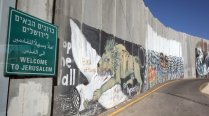For Palestinian children living in and around Jerusalem, many obstacles stand in the way of their getting a good education. While some of these obstacles are political, legal, or economic, others manifest physically and in a straightforward way: they must make their way past the Separation Wall and several scattered checkpoints and observation towers with heavily armed soldiers on top.
On a daily basis, Palestinian students traveling to and from school are forced to cross one or more of the 18 fixed military checkpoints in addition to other flying checkpoints that surround Jerusalem, which hinder the students’ and teachers’ movement and interfere with their ability to reach their schools. These checkpoints and other forms of closure (which control entry into Jerusalem from the West Bank, including East Jerusalem) cost students and teachers time and money (due to the circuitous and costly hours of travel); their sense of safety and personal dignity is also repeatedly assaulted.
According to the Palestinian Ministry of Education, 11.34 percent of Palestinian students who attend school in Jerusalem, and 29.8 percent of their teachers, cross the wall daily to reach their institutions.1 On their way, students and teachers might be subjected to ID inspection, strip searches, confiscation of school bags, arrest, and even physical violence, not to mention settler violence, all of which which commonly force students to walk in groups with a teacher escorting them to reduce their anxiety level.
According to Israeli law, children under the age of 16 are not issued ID cards, but they are required to carry alternative identification documents such as a birth certificate to present at checkpoints if they are stopped (see Precarious Status). Failure to show identification documents could leave them susceptible to interrogation and detention, including in solitary confinement. In East Jerusalem, the Israeli law allows for minors under the age of 14 to be imprisoned. In Silwan, children as young as 7 years old have been detained and interrogated.2 Evidence collected by Defense for Children International Palestine demonstrates that Israeli authorities use the law in a discriminatory manner, “denying Palestinian children in East Jerusalem of their rights from the moment of arrest to the end of legal proceedings.”3
This Photo Story sheds light on the challenges, dangers, and traumas faced by Palestinian children in Jerusalem as they make their way to school—amidst concrete structures, tightened security measures, and a heavy (and hostile) police and military presence.


